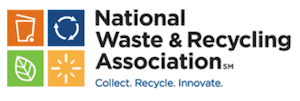NWRA, EREF Survey Highlights COVID-19’s Impact on the Waste and Recycling Industry
Arlington, VA – The National Waste & Recycling Association (NWRA) partnered with the Environmental Research & Education Foundation (EREF) to conduct a survey to learn more about how the waste and recycling industry has been affected by the novel coronavirus, COVID-19, and how it has dealt with the new challenges that have risen to the surface throughout the pandemic.
The survey was sent to a database of waste industry employees or an affiliates field, such as solid waste academia, and received nearly 400 responses. Of those responses, three-quarters included the following sectors: waste haulers, consulting firms, municipalities, government agencies and academic institutions.
For the survey, the respondents weighed in on topics such as short- and long-term impacts; employee safety and health concerns; operational best practices; changes in revenues, services, waste streams and waste volumes; and more.
The findings were similar to other industry surveys, with waste haulers being most affected, residential waste seeing the largest increase, staffing accounting for the greatest short-term impact and two-thirds of respondents facing moderate to severe operations impacts due to COVID-19 restrictions.
“Deemed essential, waste and recycling workers and operators have taken the necessary actions to face new challenges head-on and continue operating in a safe manner,” said NWRA President and CEO Darrell Smith. “In fact, two-thirds of survey respondents have implemented three or more measures to protect employees and customers, such as social distancing, working from home and implementing additional cleaning and sanitizing measures. These best practices, along with resiliency plans, are expected to remain in place as the nation begins to reopen and more employees head back to work.”
“While this is a novel virus, waste management entities have a long history of being safety-focused, and as a result have been well equipped to manage waste through the pandemic,” said EREF President and CEO Bryan Staley.
To read the key survey findings in their entirety, click here.
NWRA and EREF are also working closely with the Institute of Scrap Recycling Industries and the Solid Waste Association of North America on a study to determine the frequency and causes of fires at scrap and recycling facilities.
The primary objective of this effort is to compile information that summarizes the following information about fires at materials recovery facilities (MRFs), scrap recycling facilities and collection vehicles:
- Frequency of MRF and scrap recycling fires annually (i.e., percentage of facilities)
- Frequency of collection vehicles fires
- Suspected cause(s) of these fires
- Strategies/technologies used to fight the fire
- Damage caused by the fire (e.g., property, personnel injury/death, lost operating revenue)
- Preventative measures taken to minimize the potential for fires
- Likelihood for lithium-ion batteries to be disposed of at MRFs or scrap yards and potential to cause a fire
For more information on how to participate in this study, click here.
###
ABOUT NWRA
The National Waste & Recycling Association (NWRA) represents the private sector waste and recycling services industry. Association members conduct business in all 50 states and include companies that manage waste, recycling and medical waste, equipment manufacturers and distributors, and a variety of other service providers. For more information about NWRA, please visit www.wasterecycling.org.
Contact
Brandon Wright
National Waste and Recycling Association
bwright@wasterecycling.org
202-364-3706

